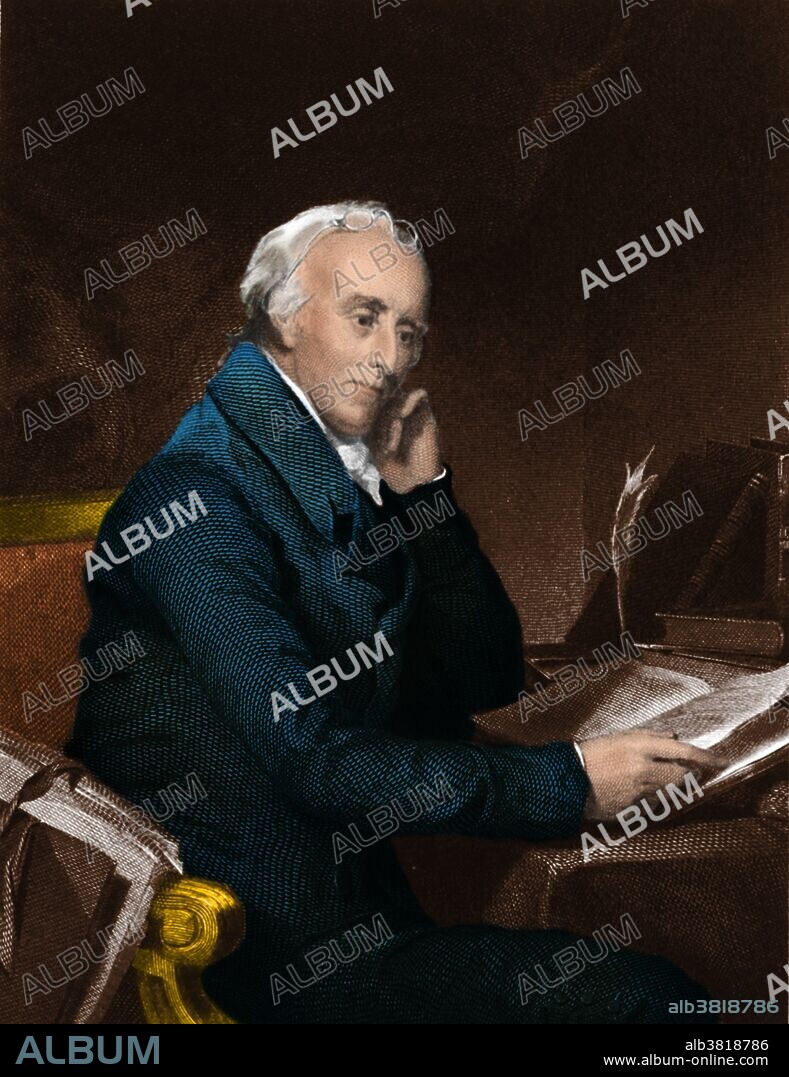alb3818786
Benjamin Rush, American Physician and Educator

|
Add to another lightbox |
|
Add to another lightbox |



Buy this image.
Select the use:

Title:
Benjamin Rush, American Physician and Educator
Caption:
Benjamin Rush (January 4, 1746 - April 19, 1813) was a Founding Father of the United States. He was a physician, writer, educator, and humanitarian. He signed the Declaration of Independence, attended the Continental Congress, and served as Surgeon General in the Continental army. Later in life, he became a professor of chemistry, medical theory, and clinical practice at the University of Pennsylvania. Rush was a leader of the American Enlightenment. He was prominent in many reforms, especially in the areas of medicine and education. He opposed slavery, advocated free public schools, and sought improved education for women and a more enlightened penal system. As a leading physician, he had a major impact on the emerging medical profession. As an Enlightenment intellectual, he was committed to organizing all medical knowledge around explanatory theories, rather than rely on empirical methods. . He promoted public health by advocating clean environment and stressing the importance of personal and military hygiene. His study of mental disorder made him one of the founders of American psychiatry. He died of of typhus fever in 1813 at the age of 68.
Credit:
Album / Science Source / New York Public Library
Releases:
Model: No - Property: No
Rights questions?
Rights questions?
Image size:
2550 x 3311 px | 24.2 MB
Print size:
21.6 x 28.0 cm | 8.5 x 11.0 in (300 dpi)
Keywords:
1746 • 1813 • 18TH CENTURY • 18TH CENTURY, THE • 18TH CENTURY. • 18TH • 19TH CENTURY • AMERICAN ENLIGHTENMENT • AMERICAN • ART • ARTWORK • AUTHOR • BENJAMIN RUSH • CELEBRITIES • CELEBRITY • COLORIZED • CONTINENTAL CONGRESS • DRAWING • EDUCATION REFORM • EDUCATOR • ENGRAVING • ENHANCEMENT • FAMOUS PEOPLE • FAMOUS • FIGURE • FOUNDERS OF AMERICAN PSYCHIATRY • FOUNDING FATHER • GOVERNMENT • HISTORIC • HISTORICAL DOCTOR • HISTORICAL PHYSICIAN • HISTORICAL • HISTORY • HUMANITARIAN • ILLUSTRATION • ILLUSTRATIONS • IMPORTANT • MALE • MAN • MEDICAL • MEDICINAL • MEDICINE • MEN • NOTABLE • PEOPLE • PERSON • PERSONALITIES • PERSONALITY • PORTRAIT • POTRAIT • PRE-SCHOOL TEACHER (FEMALE) • PROFESSOR • PUBLIC HEALTH ADVOCATE • RUSH • SIGNED DECLARATION OF INDEPENDENCE • TUTOR (FEMALE) • UNITED STATES • US • USA • WELL-KNOWN • WRITER • XVIII CENTURY
 Pinterest
Pinterest Twitter
Twitter Facebook
Facebook Copy link
Copy link Email
Email
